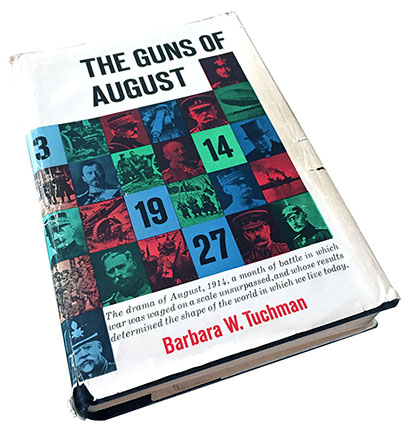The Guns of August

1914: The Start of the Great War
By JH Vine Voice
Barbara Tuchman provides a vivid picture of the prelude to war in The Guns of August. She explores the leaders of the major powers and their actions years before the war. She discusses Kaiser Wilhelm II's expansionist rhetoric, his split with Bismarck, and his diplomatic ineptness in the face of opposition. Tuchman discusses the war plans for Germany (the Schlieffen Plan), France (Plan XVII), England, and Russia. She discusses the cooperation of French and English War Departments planning for German attack on France.
Tuchman focuses on events leading up to 1914 that hardened the combatants to their respective sides. She explores the French/German conflict in Alsace-Lorraine. She explains the French preoccupation with the offensive. She outlines the military leadership of France. She also discusses the inadequateness of Russia for war. With corrupt civil and military government, advancement of officers not based on merit, and the Minister of War that did not believe in modern warfare, Russia finds itself unready for war. Tuchman also elaborates on collaboration of France and England. She explains the difficulty of England in stating its position and declaring war.
However, Tuchman pays no attention to the assassination of Archduke Franz Ferdinand, heir to Austrian-Hungarian Empire, and Serbian conflict other than noting its occurrence. In my opinion, she misjudges the motivations of the empire. If the vice president of the United States or heir to the English Crown was assassinated by a foreign power, war would have resulted. Tuchman's fails to deliver the diplomatic exchanges between Austria, Serbia, and Russia. I would recommend John Keegan's The First World War for a more thorough account of these events.
Tuchman coverage of war as it unfolds is masterful. She writes about the actions of the German capital ships Goeben and Breslau in the Mediterranean and their assistance in causing the Ottoman Empire to enter the war. Tuchman then writes of the opening actions of the Western front. She describes the destructive advance of the German army through Belgium. She tells us of the defiant Belgian defense against the Germans. She details the brutal reprisals perpetrated by the Germans on the Belgian populous. German savagery in Belgium and France serves as a prelude to the atrocities carried out by Germans in the second World War. It shows that the German military was already conditioned for cruelty before Hitler came to power.
The author shows evidence of the French ignoring the warning signs about the strength of the German right wing in pursuit of their own offensive following Plan XVII. Tuchman describes the Battle of the Frontiers with the French assaults in the South that were blunted, and the successful counterattack by the Germans. She discusses the lack of coordination between the British and French armies and General Lanrezac's efforts to defend the French left wing. Tuchman writes of the French retreat after the Battle of the Frontiers and sets the scene for the Battle of the Marne. She doesn't actually describe this Battle of the Marne or the details of the outcome. But, Tuchman successfully describes what led up to the German failure to complete their victorious drive into France. She discusses the failure of plans and the pressure to change plans in the face of perceived enemy action and status.
Tuchman also follows the Battle of Tannenberg. She discusses the rushed Russian mobilization and advance. The author describes the reaction by the German command. She writes of the replacement of Prittwitz by Hindenburg and Ludendorff. She relates Hoffman's plan to shift the army to face the Southern Russian army in the face of the pause of the Northern Russian army. She then describes the envelopment and destruction of the Russian 2nd Army and its inglorious retreat. She also notes that despite the Russian failure on the Eastern front, they did cause German forces to be drawn to the Eastern front which helped weaken the German right wing on the Western front.
The Guns of August is a fast paced engaging story that will hook any history lover. However, readers who have not read anything about WWI may feel put off by the ending stopping short and leaving the rest of the war untold. I would recommend a comprehensive history of WWI like John Keegan's The First World War to complement this book.